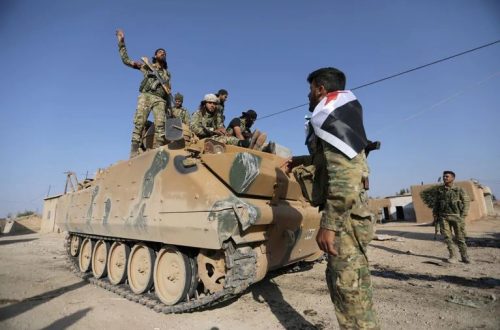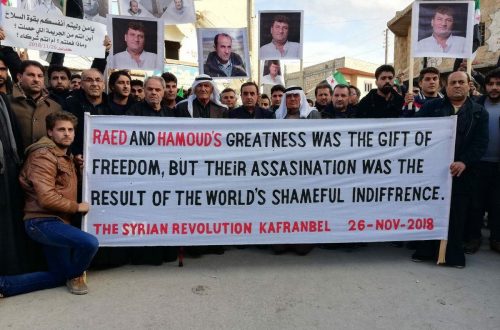This is a cross-post by James Snell
Things are done quite differently today. When populations are starved, held captive against their will, there are certain actions which can be put into place. It is very likely that there will be a camera present, for example, with which to document the atrocities in real time. It is likely that those affected, or those assigned to help them or to protect them, will have access to the sort of technology which allows for the dissemination of images, video footage, and personal testimony of the horrors sadly unfolding.
This does not make the grinding terror of famine – especially man-made famine – any less wrenching. It does not put food in the stomachs of starving children; it does not do so fast enough. It does not prevent the impulse which drives those for whom the use of starvation as a weapon of war seems reasonable, even preferable. But things can be done; the world – the much vaunted ‘international community’ – can be alerted; petitions can be signed, news stories run, campaigns orchestrated. And beyond the internet ephemera, a real response can be assembled.
Such things no longer live in a vacuum, as we have seen from the widespread coverage of – and nearly as widespread revulsion at – the terror-sieges imposed upon captive Syrians by a coming together of what remains of the Assad regime and its various sectarian allies and proxies. Of them, one holds the most emotional potency: Madaya. Formerly a tourist resort in happier times, this small town has found itself under siege for months. Many have starved to death, and the town’s children are reduced to eating the leaves cut from increasingly bare trees.
Naturally, when this situation became known to the wider world there was an outpouring of emotion: shock at the barbarous potential of our fellow men; a genuine sadness born of a species of extreme empathy; and fury – anger which manifested itself in astonishment that the UN appeared to be doing nothing, including allowing the Assad regime to censor its coverage of the terror-famines, according to Foreign Policy.
All of this is undoubtedly dire; and the fact that Assad’s forces have a particular emphasis on starvation tactics means that this barbarity will continue to be unleashed upon Syrian civilians as long as the war continues and the regime remains in power. But a small amount of hope can be gleaned from such things. The fact that the world appears to care is a start. We can only hope this apparent display of fellow-feeling serves to catalyse an effective response.
Years before now, however, when governments active sought to starve their populations, they could do so with depressing ease. In 1932 and 1933, the Holodomor, a man-made famine, killed millions of Ukrainians. It did so while grain rotted in the nation’s silos and sidings. Those in a position to alleviate this tragedy either did not do so for ideological reasons, or they deliberately increased its intensity, hoping to chastise the Ukrainian Soviet Socialist Republic for its independence of spirit.
As Robert Conquest relates in The Harvest of Sorrow, the famine was perpetrated alongside the mass deportation of the ‘kulak’ classes, who were presumed to be – by dint of little more than being wealthier peasants – subversive elements which were hostile to the new regime. By the end of this period – as was so often the case in totalitarian systems – the grinding gears of the state had become almost blackly comic, as party functionaries debated exactly who of those remaining qualified as a counter-revolutionary and a kulak.
Like what is going on in Madaya, this was a tragedy orchestrated by a dictatorial government bent on subjugation; but things were given a more sinister undertone (if that were possible) by the grim insistence of many at the top of the Soviet system to applying the rigid strictures of ideology to any policies intended to reduce the immense human tragedy unfolding in Ukraine. The ‘mind-forg’d manacles’ of dogma are not an excuse Assad and Hezbollah can muster to explain the starving civilians of Madaya. But, as Conquest wrote about Stalin, ‘[w]e may add that the banning of foreign reporters from the famine areas is, indeed, a further tacit admission by the authorities of what was going on’.
When Conquest first wrote his book, he was greeted with derision from some corners. He had spoken to partial witnesses, apologists spluttered; they had a grievance against the Soviet Union which was entirely unrelated to the deaths of their loved ones and the crippling of their culture. It was alleged that he was a simple Russophobe, intent on nothing more than criticising the USSR and using anything in pursuit of that goal. Now the archives have been opened, and his fundamental narrative – and the stories of those he interviewed and quoted – has been proven to be true.
In the internet age we do not need to wait for the fall of the regime and the opening of the archives. We can know the extent of horrors such as these simply by switching on a television or reading a newspaper or visiting a website. This ought to provide strength, both moral and political, in the fight against tyranny and its myriad excesses. But such things can never come easily. In the weeks after the plight of Madaya became internationally known, partisans and supporters of Hezbollah and Assad took a perverse pleasure in photographing their food and promulgating the resultant images online, with the apparent intention of taunting those who were dying with little more than grass in their mouths.
The malice these people feel for the besieged needs no further explanation; it represents the dark heart of modern warfare, which is just as vicious, just as capricious and just as sectarian as the methods of Stalin and his allies in committing mass murder in Ukraine.
The anger and emotion generated by the images of Madaya and similar places cannot be allowed fully to dissipate. It is therefore perversely lucky that aspects of modern technology mean that the preservation of the worst of humanity – the true nature of the terror-famine – is simply a click away.


